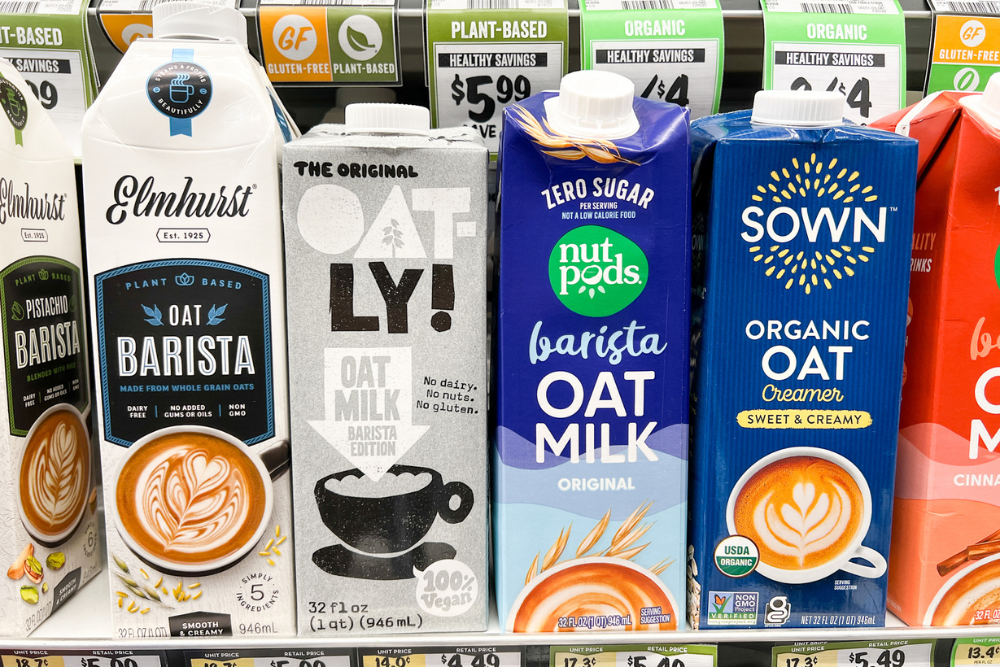
It seems like oat milk is everywhere these days, and if you’re following a gluten-free diet, you might be asking yourself, is oat milk gluten-free? In this article, I discuss why oat milk may – or may not be – gluten-free and whether it’s safe to consume on a gluten-free diet. I also tested Silk Oat milk for hidden gluten and was shocked by the results. This article contains affiliate links. Please see my disclosures.
The explosion of dairy-free “milk” alternatives is hard to ignore. There’s almond milk, cashew milk, flax milk, pea milk, soy milk, rice milk, coconut milk, and now, oat milk.
Oat milk is made by soaking oats in water, pulverizing the oats in a blender, and then straining the oats and preserving the creamy, milk-like substance.
If you’re following a diet free of gluten, a protein found in wheat, rye, and barley, you might be wondering if oat milk is something you can safely consume.
Is Oat Milk Gluten-Free?
Oat milk can be safe to consume on a gluten-free diet, but it depends on several factors, including what brand you’re using and how the brand tests its products for gluten.
Oats are an extremely controversial ingredient in gluten-free land; even certified gluten-free labeled oats have been shown to contain gluten. Again, it depends on how the oats are processed and if the manufacturer has safe allergen protocols in place.
The bottom line is that oat milk can be gluten-free, but it’s essential to understand the many nuances surrounding oats first.
Why Are Oats Controversial?
Oats are technically gluten-free; however, they’re controversial for several reasons:
(1) Oats are notoriously cross-contaminated with wheat during the growing, harvesting, and manufacturing processes, and a significant amount of wheat can be found comingled with oat grains.
Many manufacturers grow purity protocol oats, which means the oats are grown in dedicated oat fields.
Other manufacturers use regular, commodity oats that are optically or mechanically sorted and scrubbed for any gluten residue.
Both purity protocol and commodity oats can be gluten-free; it depends on the manufacturer’s processes, testing, and final claims and assurances.
(2) Some people with celiac disease experience a phenomenon called cross-reactivity. This means their immune systems react to a protein in oats (avenin), similarly to how their immune system reacts to gluten.
People with oat cross-reactivity should avoid all oat products, including oat milk.
Learn more about cross-reactivity in my article, Understanding Gluten Cross-Reactivity and Gluten Cross-Reactive Foods.
Which Oat Milk Brands are Gluten-Free?
If you want to enjoy oat milk and follow a strict gluten-free diet, you can use consume any of the following brands of oat milk:
- Califia Farms says on its website that its oat milk products are gluten-free.
- Chobani says on its website that its oat milk products are made with gluten-free oats.
- Elmhurst says on its website that all of its oat milk products are gluten-free; its label says that it’s certified gluten-free by the GFCO.
- Nut Pods oat milk is certified gluten-free by the GFCO.
- Rise Brewing Co. oat milk is labeled gluten-free on the packaging.
- Sown Oat Creamer is certified gluten-free by the GFCO.
- Oatly says on its website that all of its products are certified gluten-free by the GFCO.
- Planet Oat says on its website that its oat milk and creamers are gluten-free. Please note that its oat milk ice creams contain gluten and should be avoided.
- Trader Joe’s displays a gluten-free claim describing its non-dairy oat beverage on its website.
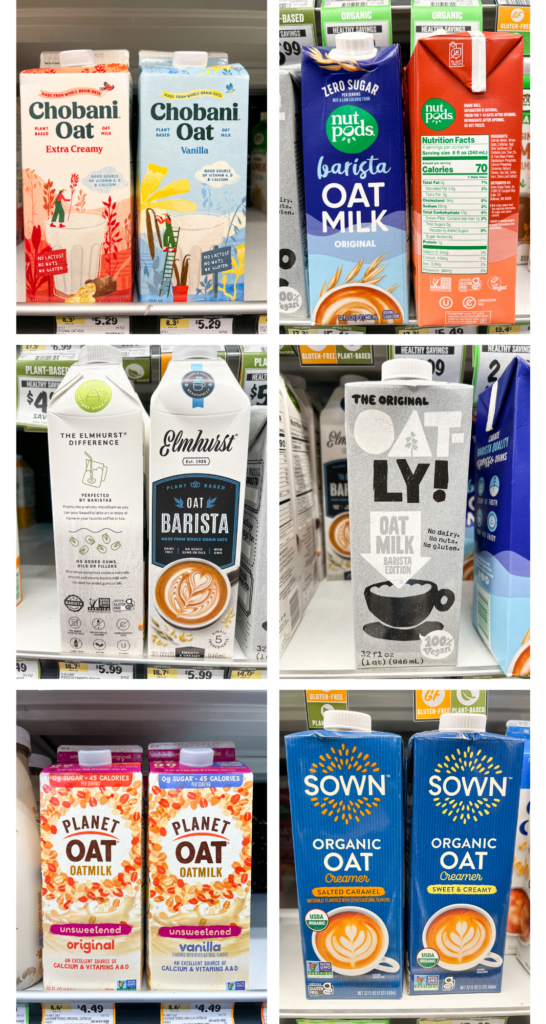
Several members of the gluten-free community have tested oat milk products for hidden gluten using a Nima Sensor, a portable gluten-detecting device.
(If you don’t know about Nima, you can learn more in my article, What You Need to Know About Nima Sensor Before You Buy – Perspective from a Celiac & Nutrition Professional.)
They found that the following brands tested a-okay with Nima:
- Nut Pods Oat – No gluten found
- Oatly – No gluten found
- Planet Oat Milk – No gluten found
- Sprout Oat Milk Whipped Topping – No gluten found
- Trader Joe’s Oat Non-Dairy Beverage – No gluten found
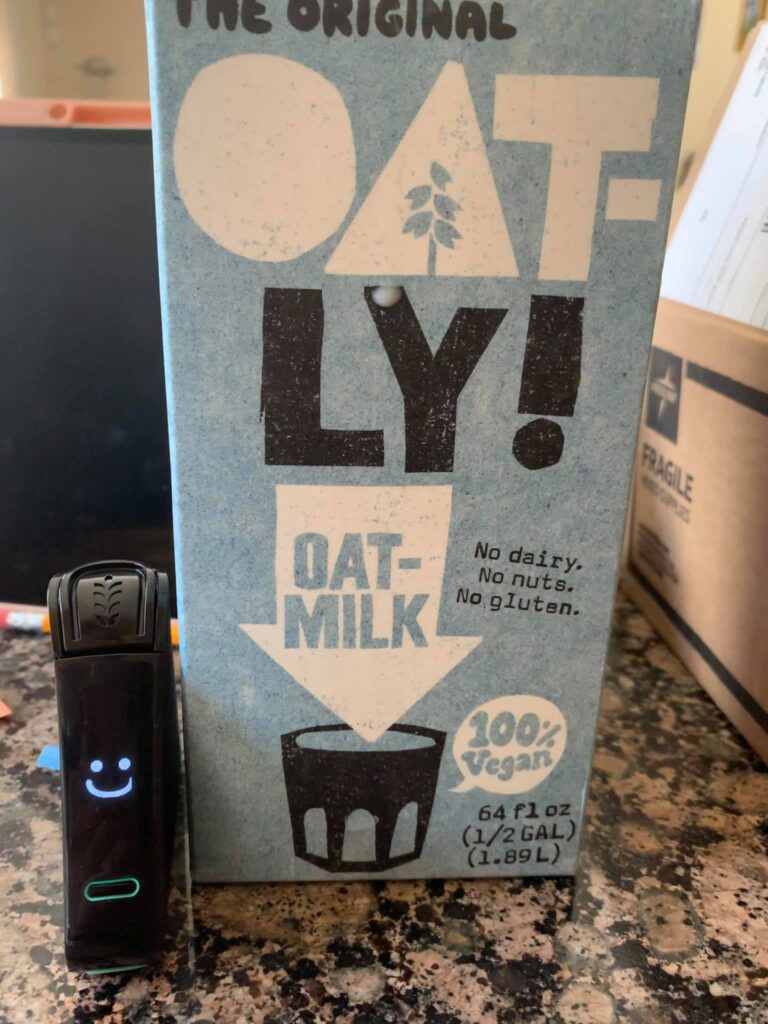
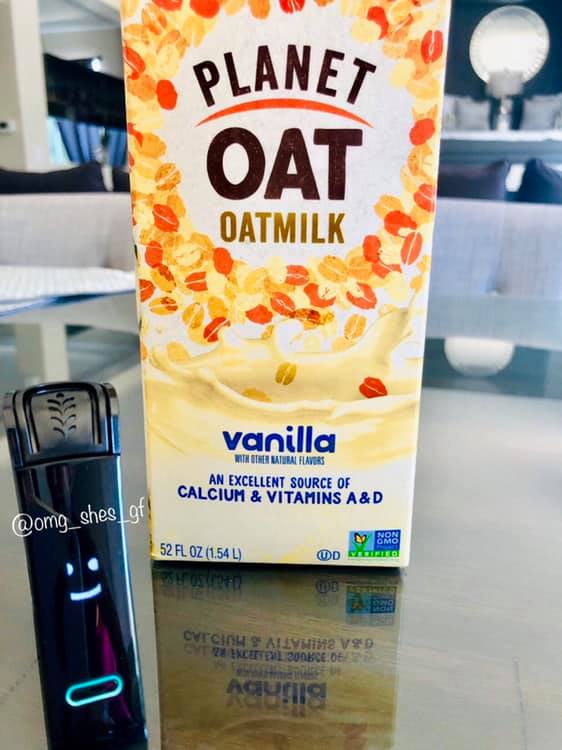
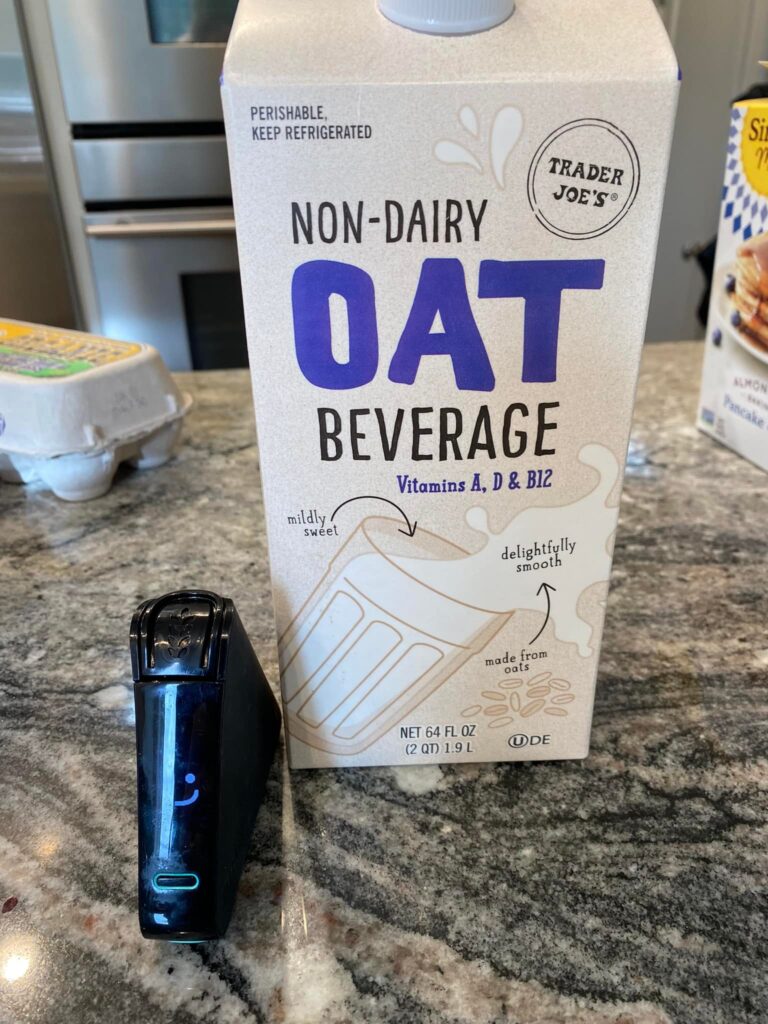
Avoid These Oat Milk Brands
Several oat milk brands contain gluten or are not marked gluten-free. They should be avoided by anyone on a gluten-free diet.
- Earth’s Own used to use gluten-free oats, but the company says it switched to non-GF oats on its website. The company took the gluten-free claim off its packaging. This is an excellent reminder to always check packaging for the latest information about the safety of a product. I’ve compiled a list of brands that used to be gluten-free but are not anymore.
- Kirkland oat milk from Costco is not labeled gluten-free, so it’s assumed that it’s not made with gluten-free oats.
- Pacific Foods says on its website that its oats are not gluten-free, so its oat milk beverage is not gluten-free.
- Silk Oat Milk offers contradictory information about the safety of its product and is not to be trusted. I independently tested it for hidden gluten. See the results below.
- Sprouts Oat Milk is not labeled gluten-free.
- Thrive Market makes no gluten-free claims about its oat milk beverage on its website.
Is Silk Oat Milk Gluten-Free?
Silk Oat Milk shares contradictory information about whether or not its oat milk is gluten-free, and it didn’t go well when I tested it for hidden gluten.
On the Silk FAQ web page, it says all Silk beverages are gluten-free except for its oat milk (Oat Yeah was rebranded as Silk Oat Milk). Below is a screenshot taken from the Silk website in early March 2021. This information remains on the Silk website as of August 2022.

Yet, Silk Oat Milk cartons are labeled “free from gluten.” Confusing, right?
I asked the company, and they said, “As of October 2020, our new Oat Yeah [now rebranded as oat milk] beverage recipe is gluten-free. The most up-to-date information on our products will be on the cartons themselves.”
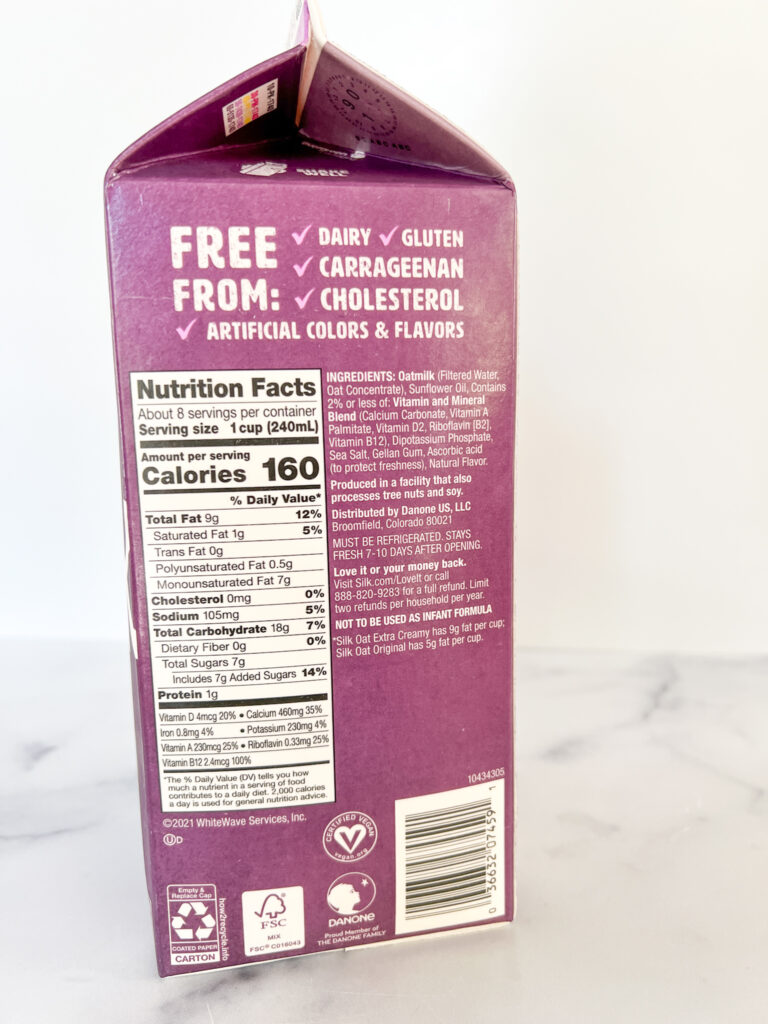
This conflicting information led me to independently test Silk Oat milk with my Nima, a portable gluten-detecting device. Unfortunately, as suspected, Nima found gluten. I tested it twice to be sure.
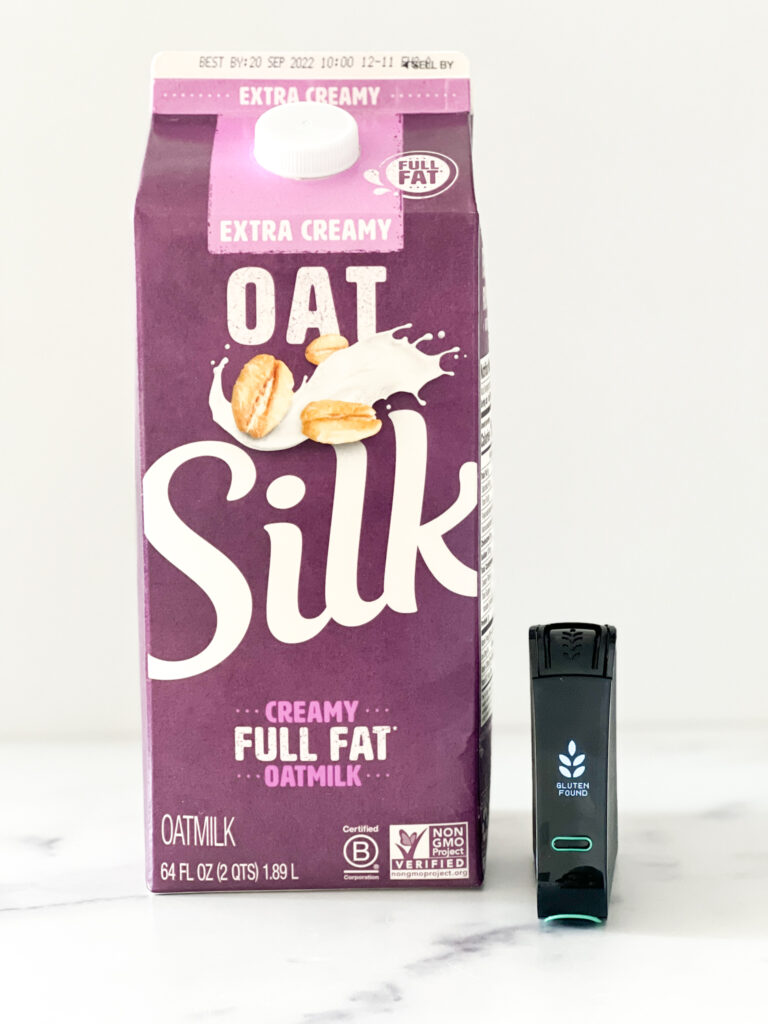
If you’re following a strict gluten-free diet, I recommend avoiding Silk Oat milk and all Silk Oat milk products, including Silk Oat milk creamers. Something isn’t adding up.
Is Starbucks Oat Milk Gluten-Free?
Starbucks says it exclusively uses Oatly oat milk inside its coffee shops, which comes as a relief to the gluten-free community who would have otherwise been worried about gluten cross-contamination inside their favorite espresso drinks.
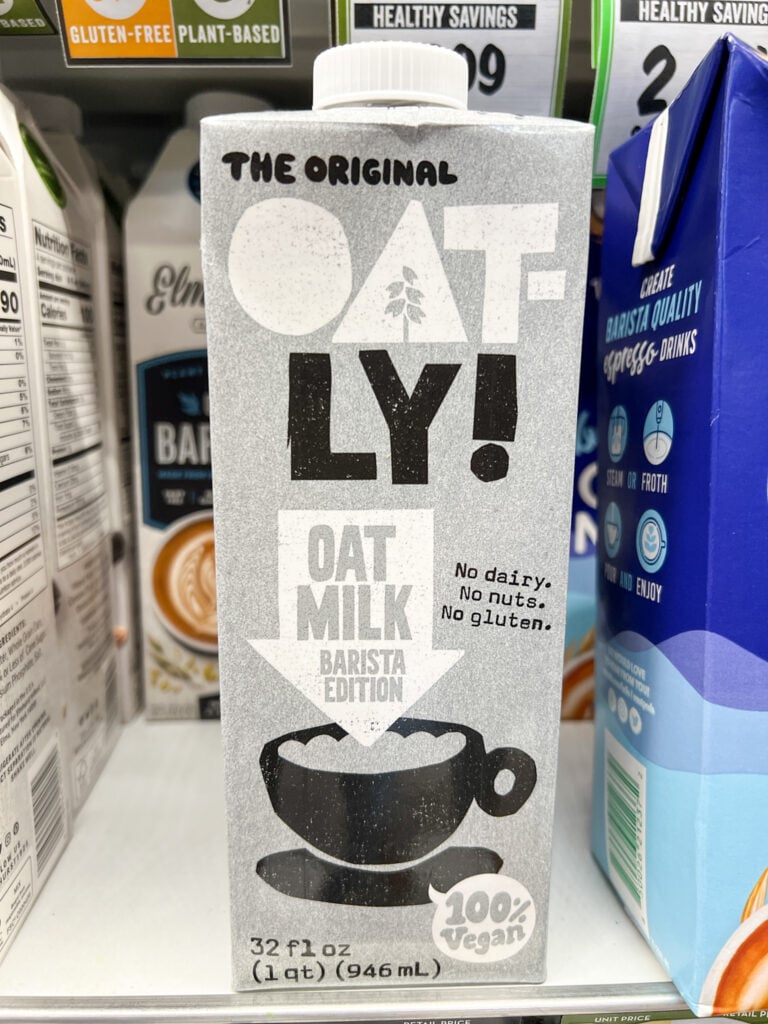
Rest assured, all Oatly products are made with certified gluten-free oats and are certified gluten-free by the GFCO, according to Oatly.
Be sure to confirm with your server that the specific location uses Oatly oat milk if you’re requesting oat milk in your beverage.
Also, learn more about what’s gluten-free at Starbucks in my article, These 90+ Foods and Beverages at Starbucks are Gluten-Free.
How to Enjoy Oat Milk
Oat milk can pack a nutritional punch if you’re looking for a dairy-free “milk” alternative and are comfortable with the potential risks.
(1) Protein: Oat milk contains about 3 grams of protein per one-cup serving, whereas milk contains about 6 grams per serving, and soy milk contains about 7-8 grams of protein per serving. Oat milk does not contain all nine essential amino acids like dairy milk.
(2) Calories: One cup of unsweetened oat milk is about 80-120 calories compared to about 150 calories in a single cup of whole milk (skim milk contains 83 calories). Unsweetened soy milk has roughly 130 calories per cup, flax milk has 25, almond milk has 60, and coconut milk has 80.
(3) Nutrients: Oat milk offers a good source of vitamin D, vitamin B12, calcium, and riboflavin, particularly if the brand of oat milk is fortified (most are). Oat milk also offers 2-4 grams of fiber, while dairy milk offers none.
You can enjoy oat milk as you would enjoy regular milk, but here are a few ways to get started:
- Add oat milk as a creamer to coffee or tea.
- Pour oat milk over your cereal, even gluten-free Cheerios.
- Add oat milk to any blended smoothie.
- Enjoy oat milk ice cream.
- Use it as a dairy-free substitute in baking.
- Drink it as is (if that’s your thing).
The Bottom Line on Oat Milk
Oat milk can be gluten-free if made with gluten-free oats and labeled gluten-free. However, as you can see, Silk Oat milk contains gluten despite being labeled “free from gluten.”
If you want to enjoy oat milk, I recommend looking for certified gluten-free oat milk brands, such as Oatly, Elmhurst, or Nut Pods.
And if you experience a reaction to oat milk, look for another milk alternative in the future.
Additional Reading
- Are Oats Gluten-Free? Unpacking Confusing and Contradictory Information
- The Gluten-Free Watchdog Takes Extreme Stance Against Gluten-Free Oats
- Understanding Gluten Cross-Reactivity and Gluten Cross-Reactive Foods
- Easy Gluten-Free Oat Bread
- How to Make Oat Flour at Home
- Unpacking the Gluten-Free Cheerios Controversy: Is It Time to Reconsider Your Stance?
has anyone heard of spelt and barley vegan milks? I found on such urls of plant-milk.org that had the following sentences (Spelt milk is also lactose free and gluten free.), and (Barley milk is also lactose free and gluten free.) The website owner must think that if milk and starch would dissolve from such vegan base dough ball but the gluten doesn’t dissolve, then such plant milks are gluten free. The only way to determine is to gluten test with either nima or allis-sensor. If it finds more gluten than a gluten disorder patient could handle, The end of the sentences would be misbranded. If the milks have too much unavoidable gluten presence, it should be put in a distillate equipment. Any glutens and toxins would be kept behind.
Making my own oat milk from Gluten-Free Harvest rolled oats is so ridiculously simple … this entire issue goes away with the purchase of a simple Nut Milk Bag (definitely purchase one made of organic cotton or other such clean option). Soak some oats overnight. Blend in a bullet-style blender. Pour into a strainer with a nut milk bag below it. Squeeze a little.
And unlike almond or rice milk (also brain-dead simple to make at home), the pulp can be eaten immediately as well. I sprinkle it on my fruit or oatmeal. It’s just drier and finer.
Califia farms contains gluten per Nima testing I did about a year ago – reached out to the company. Only response from them was it contained levels below guidelines. They didn’t take my email seriously.
Thank you for the article! I tested Califia Farms oat milk about a year ago and it came back after testing it three times to be sure – as gluten found. I reached out to the company. No help there. They responded it is gluten free according to guidelines. Nima said otherwise. So I have avoided this brand.
Thanks for this. I’ve reacted to Silk and Chobani Oatmilks in the past. I think it’s best to stick with Oatmilks that are certified GF.